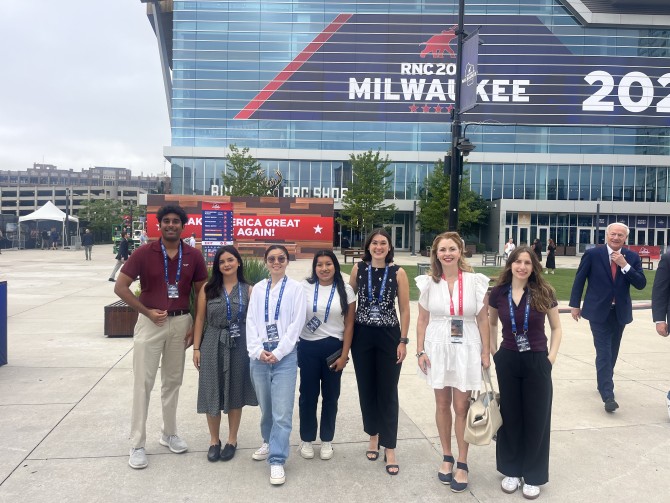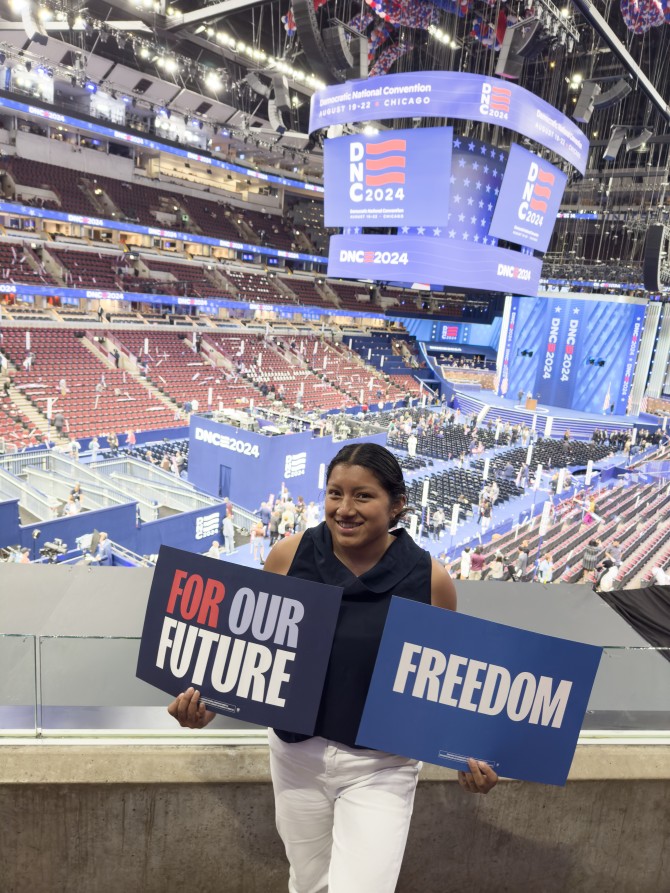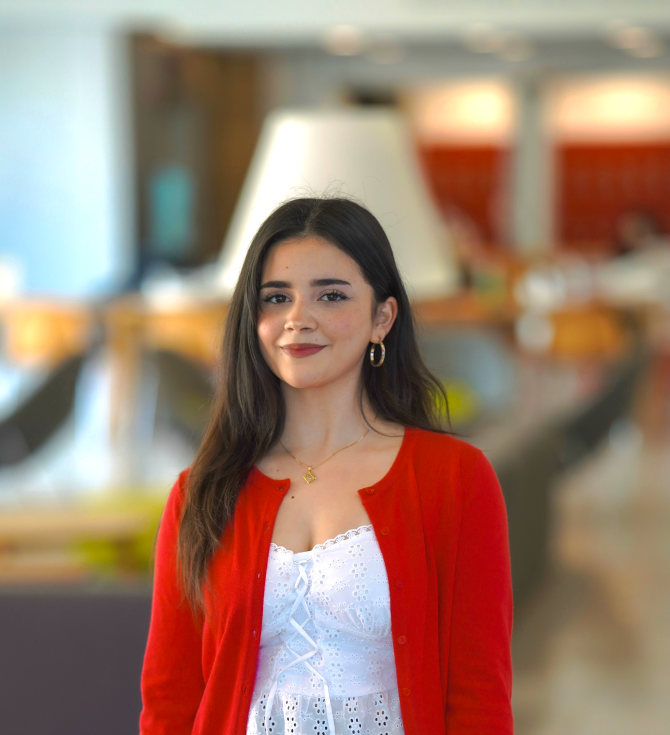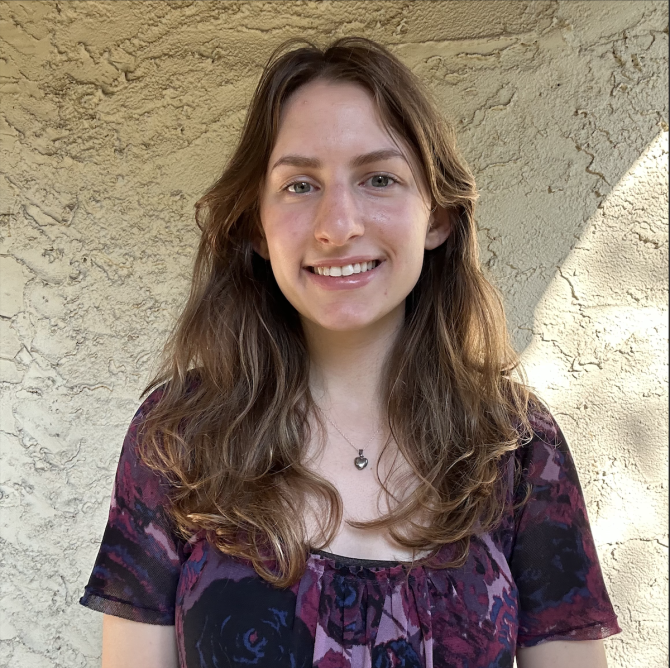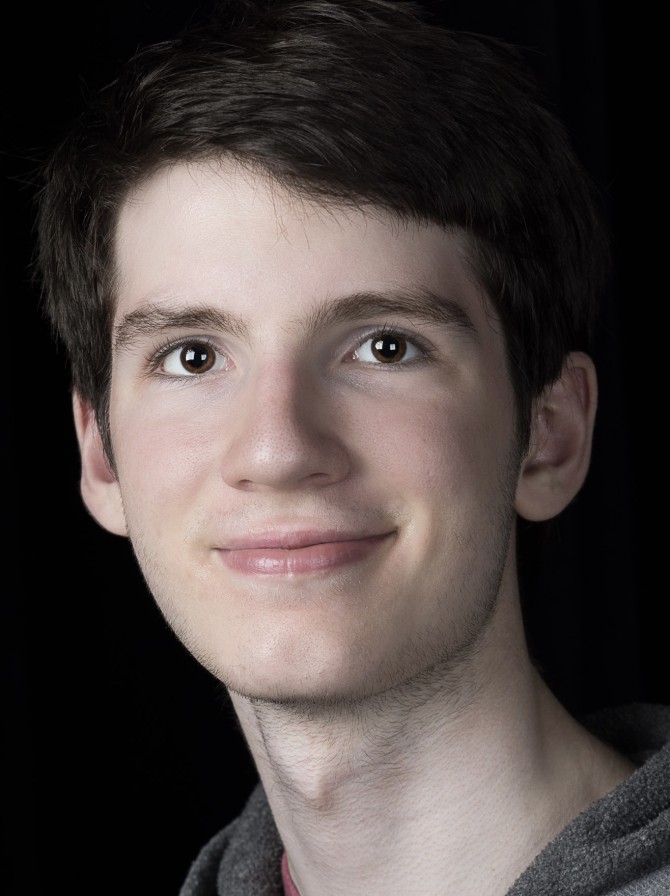
This summer a group of seven Cornell students traveled with the Brooks School Institute of Politics and Global Affairs (IOPGA) director, former Congressman Steve Israel, and senior associate director, Erin King Sweeney, to the Republican and Democratic National Conventions to get an inside look at these major political events.
News directly from Cornell's colleges and centers
Brooks students enjoy immersive experience at national conventions
By Giles Morris
This summer a group of seven Cornell students traveled with the Brooks School Institute of Politics and Global Affairs (IOPGA) director, former Congressman Steve Israel, and senior associate director, Erin King Sweeney, to the Republican and Democratic National Conventions to get an inside look at these major political events. The engaged learning experience built on Israel’s Inside Elections class, in which he offers students a view inside the American political process on what it takes to organize and win elections, and was overseen by IOPGA Faculty Director Doug Kriner, the Clinton Rossiter Professor in American Institutions in the Department of Government and the Brooks School. This trip was sponsored by the Brooks School Learning and Leading through Difference Initiative, supported in part by a generous gift from Brenda Weissman Benn ’02 and Michael Benn ’02.
“We wanted to show the students how much work it takes to put these conventions together, to help them understand how the delegates are chosen and what their experiences are, and to offer them a chance to really soak in all of the emotion and energy that goes into these events that lie at the heart of the American political process,” Israel said.
The trip to the RNC Convention in Milwaukee came just after the attempted assassination of former President Donald Trump at a rally in Pennsylvania. Students engaged with local delegations and party chairs from all over the country, interacted with pollsters and political organizers, and soaked in the atmosphere inside the ticketed perimeter in downtown Milwaukee. Highlights of the trip included interactions with senior Trump pollster John McLaughlin and former White House Chief of Staff Reince Priebus.
“In addition to understanding the larger dynamics at play, we felt it was important that the students engaged with local and regional members of the Republican Party to get an understanding of how much diversity of opinion, identity, and priorities there are within each party and how those viewpoints turn into platforms during the conventions,” said Sweeney.
Less than a month later, the same group arrived at the University of Chicago, where they were hosted alongside student delegations from Georgetown and Harvard, and witnessed another historic convention that came directly on the heels of President Joe Biden withdrawing from the presidential election. In addition to meeting with Michigan Gov. Gretchen Whitmer and hearing speeches from the Obamas and Clintons, the group got to see fellow Cornell student Edgar Vilchez address the convention about his personal experience with gun violence.
“I want to thank the Institute of Politics and Global Affairs scholars along with Congressman Israel and Professor Kriner for this experience,” said government major Megan Ventura-Lopez ’25. “I have been truly exposed to the most political arenas which have reinforced for me the necessity of active engagement in our democratic processes and the importance of voting.”
Anna Cecilia Fierro '27
Anna Cecilia Fierro is a second-year student at the Brooks School studying public policy with a concentration in Latino/a/e studies. She was excited to attend the conventions during such a crucial election year. Some of her other campus involvements include Mariachi Regional de Cornell, Speech & Debate, Mecha, and the Advocacy Project.
“I am originally from California; this is important because when you’re from a blue state you cultivate a stereotype of how you believe red state Republicans would interact with politics. Interestingly, some of these assumptions were right, but most interactions were different than what I expected. When we talked to local politicians, they explained what they thought their party’s platform faults were and where they disagreed with Donald Trump or interest groups that had a loud influence on the party. I enjoyed this aspect of Milwaukee the most.”
“Chicago was a mission from the very beginning. Passes were incredibly difficult to come by even for politicians and campaign managers who frequently were handed perimeter passes, unable to see the candidates they helped reach the convention stage speak. Our group began to reach out to anyone we knew who was in Chicago for the convention, and thankfully a Cornell student who was interning for the DNC over the summer was our ticket into the convention hall. Edgar Vilchez, a second-year at Cornell who I shared a class with last semester, heard that we were looking for a way to come in, and he took time out of his incredibly busy schedule to deliver passes to our group. Later into the convention, we saw Edgar speak on the convention stage, and it was a heartbreaking reminder of why personal stories are important to inspire real policy change.”
Kira Tretiak '27
Kira Tretiak is a second-year undergraduate student in the Brooks School of Public Policy. She is interested in politics and how policy can promote civic engagement. On campus, she is vice president of the Gender Justice Advocacy Coalition and secretary of Cornell ACLU. She has also written about the influence of money in politics in the Cornell Policy Review, the Brooks School graduate policy journal.
“At the Republican National Convention, I enjoyed getting to speak to Republican politicians working at the state level and staff working behind the scenes. Everywhere I walked, I saw people dressed in costumes (like Uncle Sam), decked out in American flags, or even in a Trump dress (his face was on the tail). Compared to the DNC, the RNC seemed to be much more focused on being fun, with the many events, bars, and restaurants filled with people located inside the perimeter.”
“Compared to the RNC, the Democratic National Convention was much more energetic. I remember entering the convention hall on the first night and joining the thousands of people cheering when Kamala Harris made a surprise appearance. My favorite speech was delivered during night two by Michelle Obama. The excitement was palpable when she walked on stage and the crowd went wild (myself included), chanting as she encouraged the audience to ‘do something.’”
Will Bradley '26
Will Bradley is a junior studying mathematics and computer science in the College of Arts and Sciences. He is interested in applying math and computer science to demographic modeling of election turnout. He has worked as a volunteer canvasser for several elections, including for Judge Janet Protasiewicz’s successful 2023 campaign for the Wisconsin Supreme Court. His appreciation for the importance of bipartisan dialogue in politics was greatly expanded through Professor Steve Israel’s Inside Elections course, taught through the Brooks School, in spring 2024.
“Arriving in Milwaukee soon after the assassination attempt on former President Donald Trump, I was most struck by the spectacle of the RNC and had no significant concern about potential political violence. A highlight of the convention was attending the CNN/Politico Grill live broadcast with House Speaker Mike Johnson, Congressman Mike Lawyer (R-NY), and Miami Mayor Francis Suarez discussing housing policy.”
“We had a packed schedule for the DNC, starting with a chance to meet Gov. Gretchen Whitmer at our host institution, the University of Chicago’s Institute of Politics, the day before the DNC started. I was able to get tickets to attend three of four nights of the DNC, and was thrilled to see both former First Lady Michelle Obama and former President Barack Obama speak in person. Although we were a long distance from the podium, experiencing the electrifying crowd reaction to their speeches was very memorable. I was also incredibly excited to see the enthusiasm for Tim Walz, who is not only my home state governor, but also represented my home district in Congress. Finally, it was a lot of fun attending the very lively New York State Democrats meeting, where Pete Buttigieg spoke via video.”
Media Contact
Get Cornell news delivered right to your inbox.
Subscribe